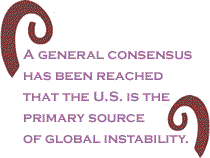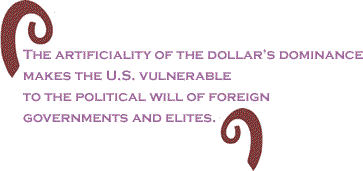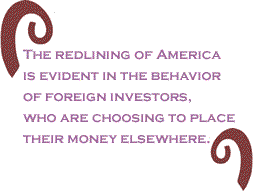
|
|||||||||||||||||||||
|
The breathtaking saga of victory and defeat that has shaped Black America since Mississippi marked its first majority white census in 1950 has unfolded entirely within the context of relentless expansion of global U.S. power. The uneven yet generally ascendant trajectory of African American mobility – geographic, social and economic – was predicated on a never before imagined fluidity within U.S. society as a whole. This national dynamic opened more spaces, more quickly, than Jim Crow could possibly restrict, revealing portals to freedom through which heroic Black men and women marched. Today’s Atlanta, for example, could not have been possible under Jim Crow; however, absent the explosion of economic growth, Jim Crow might have stood his ground a lot longer.
Never having really been more than cosmetically patriotic, corporate America put on world-class clothes and eventually began playing against the vibrant domestic economy that had given it birth. The old military-industrial/energy complex combined with predatory finance capital – now the controlling faces in corporate boardrooms – men who create nothing and hold allegiance to no nation, but rather, seek the ultimate advantage of world monopoly. In 2000 these Pirates captured Washington, DC with the plainly stated goal of subduing the globe by military force and intimidation. It is at this point that the Dream Period ended, definitively, for Black America. There will be no return in the foreseeable future to the times of robust and general domestic growth. Instead, the era of American decline is well underway, and is likely to be punctuated by abrupt, dramatic, and extremely dangerous social dislocations, during which we will learn the fuller meaning of living “in the belly of the beast.” Global Public Enemy
As history will tell, and as events daily demonstrate, the piratical decision to upset the global game board in order to impose a New American Century without rules, has united the world in revulsion against the United States. Like a strange name called out in the bedroom, the specter of American madness cannot be erased from planetary memory; even if George Bush is ejected from the White House in November, this society has shown its horrific ass to the rest of the species. America writhes in flagrante (literally, “in blazing crime”) in Iraq, caught in the global gaze like a rutting dog unable to disengage itself from the object of its lust. (Those who are offended by such images are simply unaware of how the U.S. appears to people outside the American corporate communications bubble that envelops the nation in narcissistic, racist delusions.) Polls show that majorities of Europeans believe the U.S. is roughly as great a danger to world peace as North Korea and Israel – an astounding result in the historical heartland of colonialism, among people who one would think had become inured to imperial excesses as practiced by some of their own governments. Much more ominous are the clear signals that global elites are quietly drawing red lines around the United States. These are the people who convene and attend the innumerable meetings on countless trade and finance issues that keep a wired planet in some semblance of stability. A general consensus has been reached that the U.S. is the primary source of global instability. The world’s elites are seeking to position their institutions and nations as far from the American axis as is feasible, while carefully avoiding economic catastrophe in the process. It is like planning a divorce from an insane, violent spouse who also has a key to the safety deposit box. The divorce will unfold in stages – or, under further provocation from the U.S., in earth-shaking spasms. But there is now no doubt that the U.S. is fated to shrink as the world withdraws from successive layers of entanglements with the madman. Black America must therefore prepare to marshal its collective assets for a long period of retrenchment. The world is a very different place than it was in 1954 and 1955, when the U.S. Supreme Court and Rosa Parks, respectively, dealt fatal blows to Old Jim Crow and the U.S., then producer of nearly 30 percent of world output, positioned itself to assume neo-colonial control over disintegrating European empires. The era of American expansion is over. “It had become clear
by the late Nineties that America's artificial advantages
were in danger of collapsing, and with them, the sources
of nonproductive Pirate wealth.” (See Not only did the world outgrow any rational economic basis for U.S. hegemony, but Washington repeatedly abused its paramount position for narrow U.S. corporate and dollar-gaming ends, wreaking havoc on the development plans of emerging elites around the globe while disregarding the sovereignty of all other nations. As Bloomberg’s Tokyo bureau reported in April of this year, “there's no ignoring Asia's desire to reduce U.S. influence in the region. Leaders here wonder if scrapping the dollar might expedite the process.” America and its local allies are viewed as politically bankrupt throughout the Middle East and the whole of Latin America. (Africa is another story, so drenched in misery that conventional political descriptions do not apply.) Not so big and bad, after all Long before 9/11 and Bush’s obscene 2002 “with us or against us” speech, American parochialism and compulsive advantage-taking inflicted unbearable insult on nations already overburdened with the necessity to earn dollars to pay their bills on the international market. Oil, the (unfortunate) lifeblood of economic growth, has been priced entirely in dollars since 1974.
“More than two-thirds of national foreign exchange reserves are denominated in the U.S. dollar,” according to an April 12 article in The Hindu, of India. “About 40 per cent of the dollars issued by the U.S. are held outside the country by non-U.S. nationals and entities. All this makes the U.S. currency the most powerful one in the world; the de facto international currency. This power is in part a reflection of U.S. economic supremacy during 1950-75. The global power of the dollar has continued for other reasons, a reflection, especially since 1990, of U.S. political and military supremacy.” The American currency stranglehold, no longer based on economic but on military might, allows Washington to print megatons of currency to paper over an annual half-trillion dollar trade deficit. However, the artificiality of the dollar’s dominance makes the U.S. vulnerable to the political will of foreign governments and elites, most of which would welcome a way out of the dollar trap, if one could be found. In the wake of the Iraq invasion, these elites are actively exploring strategies to expel the dollar from its central, dangerously destabilizing position in the world economy. The euro fits the bill, as we wrote on April 17.
The euro began 2003 at roughly the same value as the dollar, and now hovers around $1.25. But much more is at issue here than transient numbers. Modern currencies are backed by faith in the stability, responsibility and good judgment of the issuing nation. The United States spent decades squandering its store of good faith, and now relies as core policy on the threat of smart bombs and “regime change” to enforce its undeserved dominance in the world economic system. Staring into the chasm
International redlining is, like its domestic counterpart, a force of silent destruction, a negative phenomenon consisting of agreements not entered into, investments not made. It’s chickens not coming home, but going to roost elsewhere. The redlining of America is evident in the behavior of foreign investors, who are choosing to place their money elsewhere despite high rates of return in the U.S. Hussain Khan interpreted the data in the November 22 Asia Times piece, “Impact of Declining US Capital Inflows.” Although foreigners have been financing the [US] current-account deficit for more than a decade, the necessity for exorbitant inflows is finally catching up with the United States. The deteriorating trend in net US portfolio inflows suggests a growing reluctance by foreign private investors to shoulder this burden. Currency traders seized on September's sharp deterioration in capital flows, pushing the dollar to a record low against the euro. However, the trend has been clear for months. It is not particularly a pretty sight, and it is not particularly reassuring for the global financial system. Despite all the “recovery” hoopla from the American corporate media, foreigners are increasingly avoiding further cash entanglements with the U.S. – a clear indication of the deeply political nature of the investment recoil. On December 2, Bloomberg.com quoted Michael Woolfolk, senior currency strategist in New York at Bank of New York: “What's bedeviling the U.S. dollar now is the perception that the current-account deficit is not being adequately financed by inflows of foreign investment into U.S. securities.'' Foreign capital hangs back from U.S. capital markets despite returns on American stock investments of 12 percent – three to four times what can be earned in a sluggish but sane Europe. That the euro rises to record heights (as has the British pound) in defiance of market “fundamentals” is evidence of profound recoil from the U.S. by foreign elites. “What if all the funds parked in the U.S. are pulled out? What if this flow of capital dries up?” asked The Hindu writer in his April commentary. “The effect on the U.S. economy would be cataclysmic since the amounts involved are huge. Robert Brenner, [a] U.S. economist, estimated that in end 2000, foreign ownership of the U.S.' gross assets were equivalent to as much as 67 per cent of GDP and argued that ‘any serious attempt to flee these assets would put enormous pressure on the dollar.’” No one wants an apocalyptic crash of the World Order that is currently so enmeshed with the dollar. But it is Bush’s Pirates who represent the greatest threat to the system as it now exists. And who can say that in the next year or during a second term in the White House Bush will not unleash another horror on humanity that provokes just such a disaster for the U.S. and the world? This is the nightmare that haunts the foreign elites on whom the U.S. economy depends. Redlining is insidious, operating in the phantom world of things undone and, therefore, not subject to measurement. The lasting impact of the shock Bush’s Pirates have deliberately inflicted on the world psyche through their declaration of War on Order will be hidden in the realm of negatives: development projects launched in China, Indonesia or Brazil with little or no American participation; office towers in Baltimore or Chicago that fail to garner foreign investor backing. For true catastrophic drama, one must ponder the effects of an OPEC switch to the euro. Russia, the world’s second largest energy producer, will almost certainly ease its way into euro-denominated oil and gas transactions in the relatively near future. As we wrote in our Cover Story, “The Global Redlining of America,” October 16, “A switch to the euro ‘is really possible,’ according to Russian economist and Putin advisor Yevgeny Gavrilenkov. ‘Why not? More than half of Russia's oil trade is with Europe. But there will be great opposition to this from the United States.’” Middle East OPEC members also do a lot more business with Europe than with the United States, yet they fear the unknown. After considering discussions on the prospects of switching to the euro or a “market basket” of currencies for oil sales, cartel President Abdullah al-Attiyah of Qatar announced on December 12, "I don't think we will discuss it. I don't think it is the right time to discuss it because we believe it is not easy to switch from currency to currency. Yes, I am concerned about the weaker dollar but we believe we should be pragmatic, that we cannot switch because it is very complicated." Instead, OPEC continued its policy of keeping oil prices high to offset the fallen dollar – an unsustainable strategy, according to United Arab Emirates economic analyst Dr. Mohammad Al Asoomi: During the last two years, the US currency dipped by around 40 per cent against the euro which is rising strongly on the back of the strong performance of European economies compared with the weary US economy that is burdened with additional costs arising from military interventions in more than one region in the world.
The thrust of Dr. Al Asoomi’s Gulf News article is that, even absent additional unilateral strikes or other madness from the Bush regime, the energy producing nations of the world cannot continue to develop under a dollar denominated regime. Inevitably, a number of them will go euro, and the dollar will be toppled from its artificial position of world dominance. The shift will occur sooner if crazed George Bush remains in power, or sometime later under a Democratic administration. But it will come. Imperial currencies do not fit in “market baskets” – they morph into paper based on faith, like the rest. No matter how phased or gentle the transition, the impact on the United States domestic economy will be – difficult to imagine. What is certain is that the retrenchment will require a militant Black leadership that is willing to go toe-to-toe with corporate power, lest African Americans be overwhelmed in the scramble for scarcer resources. |
January
1, 2004 |
||||||||||||
|
||||||||||||
|
|
||||||||||||
| Printer Friendly Version | ||||||||||||
| |
||||||||||||
| |
||||||||||||






















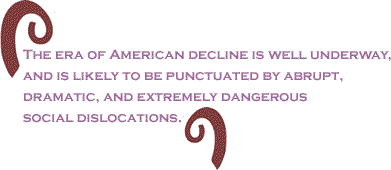
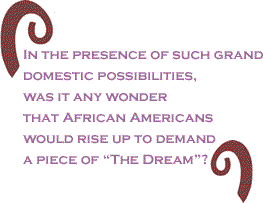 The
conditions that allowed Black people to stand on their
feet were hitched
to a larger reality: much of the globe lay at the feet of
America, the post-World War Two superpower. Believing themselves
to be super-smart but actually made invincible by super-weaponry
and the super-dollar, which had become the world currency
by default, American corporations penetrated every non-socialist
region of the planet. A considerable portion of the riches
gained through superpower advantage were repatriated to the
home country, creating for a time the highest national living
standard in all of human history. In the presence of such
grand domestic possibilities, was it any wonder that African
Americans would rise up to demand a piece of “The Dream” – or
that white folks would grudgingly back off and allow Blacks
room to breathe? After all, imperial prosperity had created
lots more space for white people; they could afford it.
The
conditions that allowed Black people to stand on their
feet were hitched
to a larger reality: much of the globe lay at the feet of
America, the post-World War Two superpower. Believing themselves
to be super-smart but actually made invincible by super-weaponry
and the super-dollar, which had become the world currency
by default, American corporations penetrated every non-socialist
region of the planet. A considerable portion of the riches
gained through superpower advantage were repatriated to the
home country, creating for a time the highest national living
standard in all of human history. In the presence of such
grand domestic possibilities, was it any wonder that African
Americans would rise up to demand a piece of “The Dream” – or
that white folks would grudgingly back off and allow Blacks
room to breathe? After all, imperial prosperity had created
lots more space for white people; they could afford it.